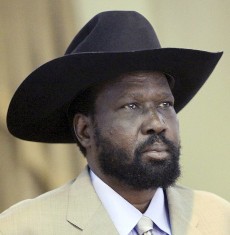South Sudan’s Kiir says referendum must take place with or without borders
July 31, 2010 (JUBA) – The referendum in Southern Sudan will take place as scheduled on 9th January 2011 whether or not the North-South borders are demarcated, says the President of the semi-autonomous region.

“There are those who are saying the referendum cannot be conducted before the demarcation of the borders. This is a very big lie,” Kiir told the crowd who responded with ululations and hand claps.
He said the borders were supposed to be conducted even before the elections but the other partner dragged its feet on the implementation of it. The elections were however conducted without borders, he added.
Kiir, who also holds the same view with his other senior colleagues in his government, seemed to have directly responded to the suggestion by the ruling National Congress Party (NCP) on Thursday that the 2011 referendum in Southern Sudan may have to be delayed until the border demarcation process is completed.
The SPLM Secretary General Pagan Amum accused the northern dominant ruling party, NCP, of historical violations agreements on self-determination. He said it was not for the first time that Khartoum’s NCP signed an agreement on self-determination.
“It was not the first time in the CPA that they [NCP] agreed on self-determination. They [Khartoum] agreed for the first time on self-determination in the 1997 Khartoum Peace Agreement and Fashoda agreement, but they violated it,” he told the cheering crowd, adding that the NCP is now beginning to talk of postponing the self-determination exercise if the North-South borders are not demarcated.
He said this was a lie and warned that whether Khartoum likes it or not the referendum must be conducted by the 9th January 2011.
A senior official of the NCP, Ibrahim Ghandour said the referendum could not be conducted if the North-South border is not demarcated, warning that failure to agree on a border could lead to a new conflict like that between Eritrea and Ethiopia.
“That is a condition for all referendums around the world that might lead to the creation of a new sovereign state,” he said.
This week the Government of Southern Sudan representative at the border Commission, Engineer Riek Degol, said that it is impossible to complete the demarcation prior to the key vote early next year. He said that the panel will adjourn its activities until next October citing the rainy season which would affect the terrain and logistics.
In Washington, the U.S. administration said that the South is “entitled” to holding the referendum as planned.
“Under the Comprehensive Peace Agreement, South Sudan is entitled to a referendum in January. We are working hard with officials in Juba to prepare for that referendum. There is a lot of work to be done to create the right conditions for the referendum to be successful. Border demarcation is one of those issues. We are – we’ve been working hard on that for some time. We hope it can be resolved before the referendum. But South Sudan is entitled to a referendum in January, and we hope that it will happen on schedule,” State Department Spokesman PJ Crowley told reporters on Thursday.
Crowley stressed that the NCP needs to cooperate with the South and the international community to complete the referendum.
“[R]ather than trying to put conditions on the referendum, it would be far better for Sudan to cooperate fully, resolve the issues – and there are a number of them – that need to be resolved prior to January. But we believe that these issues can be satisfactorily addressed so that the referendum can happen in January as is planned” he said.
Kiir also warned southerners in the North not to be deceived by the abrupt employment opportunities in the North which he said are aimed at luring them to vote for unity. He said ten thousand jobs in the North cannot be equal to the freedom of the more than ten million people in the South and the sacrifices of more than two million people who died for the struggle for freedom in Southern Sudan.
He said the late leader Dr. John Garang de Mabior reminded southerners in Rumbek whether they would choose to vote in the referendum to become second class citizens, and urged the crowd to remember that advice from the late chairman.
However, in a separate televised interview on SSTV on Friday evening with the widow of the late chairman, Rebecca Nyandeng de Mabior, she admitted that her late husband, Dr. John Garang, used to say that he would vote for unity during the referendum.
Nyandeng, who is also the Presidential Advisor on Gender and Human Rights, however further explained that late Garang had wanted to give unity a chance through making it look like a “beautiful girl” that people would want to marry.
She also said it was not necessary for Southern Sudanese people to shout in the streets, chanting the slogans for separation and added that they would rather wait for the referendum and vote.
The former leader of the Anya-Nya One rebellion and President of the High Executive Council, Joseph Lagu, narrated on the first armed struggle for freedom in the South. He urged the crowd to remember the history as it happened and explained that the first bullet for the struggle was fired on 18th August 1955 in Torit town, and that he and late Father Saturino Lohure established Anya-Nya One officially on 19th September 1963.
Tens of thousands of youth members from various political parties and civil society organizations have been staging processions in all the ten states of Southern Sudan including the capital, Juba, and neighboring countries, advocating and mobilizing the Southern Sudan population for a referendum vote on independence of the region.
Observers expect an overwhelming vote by Southerners for independence driven by bitter memories of the civil war and feeling of marginalization by the Arab-Muslim dominated North.
(ST)
